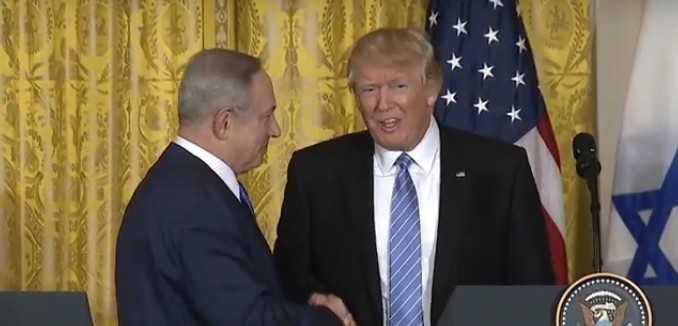In a joint press conference at the White House on Wednesday, President Donald Trump and Israeli Prime Minister Benjamin Netanyahu alluded to a new regional Middle East peace initiative that would take advantage of the stronger partnerships Israel now has with Sunni Arab states.
Both leaders made references to broader regional cooperation between Israel and its Arab neighbors, who have grown closer to the Jewish state in response to the threat from Iran. “We can seize an historic opportunity because for the first time in my lifetime and for the first time in the life of my country, Arab countries in the region do not see Israel as an enemy, but increasingly as an ally,” Netanyahu said.
He went on to explain that because of the Palestinian Authority’s refusal to acknowledge Israel as a Jewish state or stop indoctrinating its youth to hate Jews, “We have to look for new ways, new ideas, on how to re-instate and how to move peace forward. And I believe that the great opportunity for peace comes from a regional approach from involving our new found Arab partners in the pursuant of a broader peace and peace will the Palestinians.”
Trump added that the two had already been discussing such a plan, which is “something that is very different, hasn’t been discussed before. And it’s actually a much bigger deal—much more important deal in a sense. It would take in many, many countries and would cover a very large territory.” He went on to add that this “new concept…is something that allows them to show more flexibility than they have in the past, because we have a lot bigger canvas to play with.”
“There’s no way a deal can be made if [the Palestinians] are not ready to acknowledge a very, very great and important country,” Trump added. “And I think they’re going to be willing to do that also. But now I also believe, we’re going to have…other players at a very high level, and I think it might make it easier on both of Palestinians and Israel to get something done.”
The hints of wider regional cooperation are most notable between Israel and Saudi Arabia. In the past year, an Israeli minister was interviewed by a Saudi news website, retired security officials from both countries appeared together on a panel at a Washington think tank, and a retired Saudi general visited Israel. Analysts believe that below-the-radar ties between the two countries run much deeper, driven by the growing sense that Iran has become the main threat to both parties.
In an interview with Tablet last September, Ayoub Kara, then Israel’s Deputy Minister of Regional Cooperation, said that Israel’s ties with its Arab neighbors “are the best they’ve ever been.”
While Kara acknowledged that some of the relationships had to be kept quiet due to “the culture of hypocrisy,” he said that praise for Israel could be heard “by ministers and parliament members from places like Iraq, Saudi Arabia, and Morocco.” He also claimed that he had heard from a number of leaders in Gulf states that they “admire” Netanyahu and “like him so much.”
Last April, Eran Lerman, a former deputy national security advisor for the Israeli government, and Joshua Teitelbaum, an expert on Saudi Arabia and pan-Arab politics, observed in an analysis for the Begin-Sadat Center that “with the need to confront Iran high above all other considerations in the Saudi and Egyptian national security playbook – and in Israel’s – any major step that helps bring together the ‘camp of stability’ in the region under joint Egyptian-Saudi leadership will also serve Israel’s interests.”
This view was reinforced by Dore Gold, then the director-general of Israel’s Ministry of Foreign Affairs, who said in an August interview with the Financial Times that “the Sunni Arab states increasingly see the Middle East through the same prism as Israel.”
Other elements of the Trump-Netanyahu press conference were also notable, including Trump’s insistence that the Palestinians “have to get rid of some of that hate that they’re taught from a very young age.”
They’re taught tremendous hate. I’ve seen what they’re taught. And we can talk about flexibility there too, but it starts at a very young age and it starts in the school room. And they have to acknowledge Israel. They’re going to have to do that. There’s no way a deal can be made if they’re not ready to acknowledge a very, very great and important country.
Trump also indicated a shift in American policy towards the specific acceptable parameters of an Israeli-Palestinian peace agreement. Rather than insisting on a two-state solution, as his two immediate predecessors did as official policy, Trump was more ambivalent, stating, “I’m looking at two-state and one-state, and I like the one that both parties like.”
I can live with either one. I thought for a while the two-state looked like it may be the easier of the two but honestly, if Bibi and if the Palestinians—if Israel and the Palestinians are happy, I’m happy with the one they like the best.
[Photo: The White House / YouTube ]




